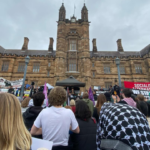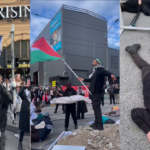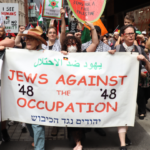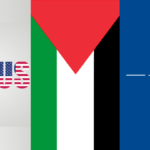The Ongoing Crackdown on the Naarm Palestine Rally Is Targeting the Right to Protest
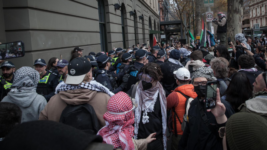
The local pro-Palestinian movement has become a force to be reckoned with over the last ten months. And the focal point of it has been the massive nonviolent and family-orientated street protests that have marched through the continent’s major cities for 38 consecutive weeks now.
The largest have been that in Naarm-Melbourne and the formidable weekly march across unceded Gadigal land in Sydney.
And while these events have been slandered by all sorts of idiotic labels from politicians wishing to obscure their message, which is Stop the Genocide in Gaza, organisers at both rallies have confirmed that, for the most part, police had been facilitating, not hindering, demonstrations.
Although that was before Victoria police decided to assault a group of 30 unarmed civilians gathered to march with OC spray on 9 June.
Members of the collective that provides the sound system and stage for the Naarm rally, Renegade Solidarity Audio Force explained last Thursday that on that same day, June 9, the approach of Victoria police shifted from a force being deployed to facilitate a public rally to one that opposed it.
RSAF put it to Sydney Criminal Lawyers that this situation had since escalated over subsequent weeks to the point that it appears the authorities are taking the moment afforded by high level political criticism of these rallies to implement a crackdown on public street protest in Victoria.
And on dropping into a livestream of the Naarm rally on Sunday afternoon, just like clockwork, what had been described by the activists just days prior, was transpiring on the screen.
Prophetic assessments
Free Palestine Melbourne member Amin Abbas explained to the 30 June protest crowd, as he stood upon the steps of the State Library that the reason he wasn’t standing on the RSAF truck, which doubles as a stage and sound system, was because the authorities now required a permit for it.
As Renegade Solidarity Audio Force’s Jacob Grech explained last week, after having been the most accommodating police presence he’d ever encountered at a protest rally for months on end, the day the OC spray was pulled out, officers too issued his group with a move-on order for the truck.
According to the veteran activist, the situation regarding the truck, as well as the aggressive attitude of officers, which had suddenly criminalised the assembled civilians, foretold of a greater repression on protest. And Grech raised the possibility of permits and graver developments being likely afoot.
“We have not required a permit” before, said Abbas, “And the City of Melbourne has not contacted us saying that you require a permit. So, as far as we are concerned, the truck is our right to assembly. The truck is our right to protest.”
“Let’s make it clear that this stage setup that we have today,” the Palestinian man continued, “isn’t going to be business as usual.”
So, following the initial 9 June move-on order, the police had been making it progressively more difficult for the truck to get to its 8-month-long established position. And by the 30 June, the entry of the RSAF truck was blocked completely, as it didn’t have the permit that didn’t exist before.
Protected in law
Abbas spoke of the right of protesters to assemble and suggested that this had always extended to the truck that police had surrounded on arrival that day.
And when Abbas did speak of this right, it was in a manner that carried more authority than one might expect a speaker to convey at a rally in Sydney. And that’s because, unlike NSW, Victoria has rights protections.
Section 16(1) of the Charter of Human Rights and Responsibilities Act 2006 (VIC) maintains that “every person has the right to peaceful assembly”, and as Grech put it last week, this is “basically the right to protest”.
If organisers of a rally want to conduct a protest in Sydney, they must submit a form to police outlining specific details, which can then be refused. However, in Naarm, there is no such system operating and indeed, if the authorities say, “No”, protesters can contend with, “We have a right.”
The 9 June shift in the attitude of Victoria police came on the back of PM Anthony Albanese and opposition leader Peter Dutton both taking a moment during 5 June question time to condemn the protests and other direct actions, deeming them antisemitic and pinning the blame on the Greens.
RSAF made the point last week that previously friendly and now reticent Victoria police officers repeatedly responded to questions on 9 June that reflected that they no longer had the discretion to act as they had in the past, meaning the change was ordered from on high.
And as Grech put it last week, he considered they’d soon start raising the need for permits, with an eye to start challenging just how far the right to public assembly actually extends.
Ending public assemblies
Victoria police presence was heavier on the ground than it had been before at last Sunday’s protest. With observers noting officers were pushing civilians off the road, issuing move-on orders and giving directions to marchers that disrupted their passage rather than facilitate it.
The images coming out of last Sunday’s Free Palestine protest in Naarm posted on social media had more of a focus on the Victoria police presence at the demonstration than was usual, with walls of blue bodies lining the streets, and while pepper spray wasn’t applied last Sunday, it was threatened.
However, the OC spray was pulled out as Victoria police scuffled with protesters early morning out the front of AW Bell’s Dandenong office the following day, due to that company’s position in supplying casting parts for F-35 planes, which are currently being used in the genocide in Gaza.
And that’s part of RSAF’s point, the crackdown on protests that it recognised at the 9 June Free Palestine protest is now being replicated at other public demonstrations. And as for what this approach is attempting to achieve, one only has to consider other jurisdictions over recent years.
NSW kicked off the campaign against unauthorised protests in April 2022, so that obstructing major roads, bridges, tunnels and facilities carries up to 2 years gaol time and/or a $22,000 fine. And Tasmania and Victoria applied new draconian penalties to forest protests in August that same year.
In terms of mirroring the NSW Liberal-implemented and Labor-continued approach to threatening civilians with long stretches inside for making a public statement, the Malinauskas government in South Australia passed similar laws in mid-2023.
And all these regimes were applied in response to climate defenders, way before the onset of the Gaza genocide.
Creating an unsafe space
But perhaps, the most disturbing aspect to the strategy it appears Victorian authorities are taking in order to apply tougher measures to street protests is, according to RSAF, due to the Free Palestine protests being peaceful, family-oriented events, officers are making them hostile environments.
And what will Victoria police achieve via this approach? Well, by turning on peaceful protesters and making the demonstrations unsafe, this will in turn, create a situation warranting the legislating of more repressive laws to shut down protests to keep the public safe.
As regardless as to whether the 30 protesters, including five children and a pregnant woman, that were set upon with OC spray on 9 June were doing anything to warrant such a response, when an image of that scene appears online, we all know that the baddies can’t be the ones dressed in blue.


